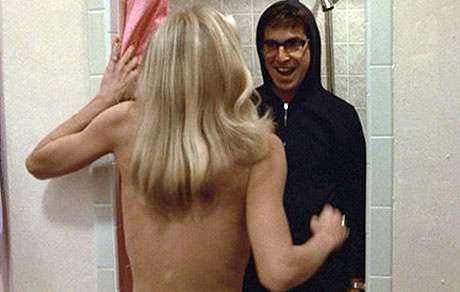Aaron Sorkin's Facts and Fictions
Facebook founder Mark Zuckerberg reacts to the social network:
Screenwriter Aaron Sorkin has been doing an deceptive little dance when it comes to his movie's accuracy. Usually he takes the position that he's an artist, not a journalist. As he told New York magazine, "I don't want my fidelity to be to the truth; I want it to be to story-telling." And that's fair enough. But when he's challenged on his storytelling choices, Sorkin falls back on a that's what really happened defense, even when he has his facts wrong.
A couple of weeks ago, for example, Sorkin offered this defense of how the film depicts women:
It's not hard to understand how bright women could be appalled by what they saw in the movie but you have to understand that that was the very specific world I was writing about….I was writing about a very angry and deeply misogynistic group of people. These aren't the cuddly nerds we made movies about in the 80's. They're very angry that the cheerleader still wants to go out with the quarterback instead of the men (boys) who are running the universe right now. The women they surround themselves with aren't women who challenge them (and frankly, no woman who could challenge them would be interested in being anywhere near them.)
That's a familiar cliché, but it's hard to square that picture with Irin Carmon's earlier comparison of the film to the facts:
Never mind that [Mark Zuckerberg] has had a serious girlfriend since 2003, which includes the time when the movie was set. That would make it hard to show Asian girls blowing him and his friend because Facebook was so cool!
In real life, plenty of members of Zuckerberg's inner circle are and were gay men. And Facebook's current success has also been predicated on the hard work of women Zuckerberg trusts, including COO Sheryl Sandberg (also a Harvard grad, profiled in The Times today) and his sister….
The fictional Mark Zuckerberg starts Facemash, a site where girls can be cruelly judged on their looks, the only thing they're good for. In real life, Facemash was criticized by groups representing women of color, but it was also equal opportunity judgment: It had men and women on it, which you'd never know from the movie. The real life Sean Parker may be a womanizer, but unlike the character played by Justin Timberlake, he didn't find out about Facebook from a nubile co-ed in Stanford panties who was thrilled to find out she'd scored with a Silicon Valley celeb -- he found out about it from his roommate's girlfriend.
It makes you wonder why the filmmakers tried so hard to create a world so hostile and diminishing to women, where -- aside from a small character for real-life Harvard grad Rashida Jones that seems to have been designed to preempt criticism -- the choices are being a stern bitch (like the ones in the administrative board hearings) or dropping your panties at the sight of power. I don't know from personal experience, but that sounds a lot more like Hollywood.
This is slightly off -- the cast includes one more woman who rises above those caricatures, though she appears in only two scenes. But Carmon's core critique is correct. Sorkin selected (and sometimes invented) the facts that would allow him to paint the digital world he despises as the spawn of a bunch of sexually frustrated misogynists. He ignored the facts that would undermine that tale. If this were journalism, it would be indefensible. As art, it reveals a writer who's guilty of some of the very sins he's trying to pin on his target.
By the way: Has Sorkin seen the movies about cuddly nerds that came out in the '80s? Rent Revenge of the Nerds sometime. It's got geeks, jocks, and cheerleaders, and its sexual politics ain't gonna win any awards from NOW. I'm just sayin'.



Show Comments (130)